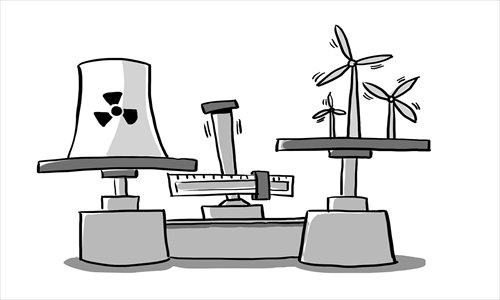Taiwan public not ready for green power

The single issue Taiwan's opposition Democratic Progressive Party (DPP) gained the most political capital with last year was its campaign against electricity price hikes implemented by the Kuomintang (KMT) government of Ma Ying-jeou. And the single issue the DPP has been gaining the most political capital with this year is its campaign for the quick scrapping of nuclear power.
Again, the DPP skillfully rides the wave of public opinion. But it owes the Taiwanese public some answers for combining these two crusades.
Before the hikes in May 2012, the Taiwan public enjoyed blissful conditions indeed when it came to electricity prices, as they were the lowest in the whole of Asia. Government-owned Taiwan Power Company generated losses, but whichever government was in power in Taiwan, it did not dare to raise rates significantly for fear of punishment at the election booths.
Unsurprisingly, the outcome was environmentally unfriendly, as electricity was wasted by industry, businesses and households. To give examples, many Taipei banks do not bother closing their doors in the stiflingly hot summers, so that entire city boulevards are cooled by the breeze of their air conditioners. And insulated windows for residential property are virtually unheard of on the island.
But when Ma eventually took his courage in both hands and raised prices to a reasonable level, the DPP gave him an earful. His policy was quickly declared the archenemy of the low and middle-income classes, and there was no acknowledgment whatsoever that what Ma did has a positive environmental impact.
Fast-forward to March 2013, and the DPP has become so "green" that it is barely recognizable.
Japan's Fukushima disaster in 2011 has understandably made nuclear power unpopular in Taiwan in a time the island's problem-plagued Fourth Nuclear Power Plant is nearing its completion.
DPP Chairman Su Tseng-chang seized the chance and jumped on the anti-nuclear bandwagon, because next year seven-in-one municipality elections will also be fought out in Taipei and New Taipei, where the No.4 plant is located.
According to Su's calculation, the anti-nuclear movement will boost the DPP candidates' chances hugely, and if the DPP would manage to unseat the KMT mayors in only one of the two important constituencies, Su would reign supreme in his party, qualifying him to run for Taiwan's leadership in 2016.
I do not argue that earthquake-prone Taiwan should have nuclear power plants. But the DPP is hardly a credible standard bearer for the environmental movement.
Among the few answers it gives to the island's energy dilemma is that the utilization of solar energy and light-emitting diodes will make Taiwan's nuclear plants obsolete. And it cites like a broken record Germany as its role model in the shift from nuclear to renewable energy.
But whoever has only the slightest clue about what's going on in Germany now knows that the Energiewende (energy turnabout) is the biggest headache that country has been having in its recent history.
There are myriads of figures and estimates that have yet to add up, and even though there is a very broad "green" consensus in that society, the turnabout's eventual success can by no means been taken for granted.
Taipei Mayor Hau Lung-bin recently said that "If Taiwan wants to become a nuclear-free homeland, we have to all bear the consequences."
Take my northern German hometown of Varel. Although Varel is a reasonably well-off place, all municipal street lighting there is turned off at midnight sharp to be switched back on at 5 am.
It is so pitch dark during these hours that you don't have to be an infirm senior citizen to trip over a curbstone and fracture an ankle, but Varel's ruling and opposition parties as well as its citizens by and large agree that such harsh measures are the lesser evil compared to a higher municipal electricity bill and ever more environmentally damaging power production.
I have every reason to doubt that the Taiwanese electorate, spoiled by decades of cheap power, would put up without grumble with what the island's own Energiewende will bring along.
If Taiwan pulls the plug on environmentally damaging power generation, and a future KMT government goes about switching the street lighting off, it will throw fuel on the DPP's political fire.
The author is a Taipei-based journalist. opinion@globaltimes.com.cn